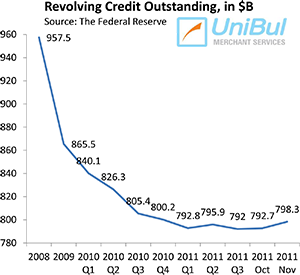Bank Responsibilities in the Clearing and Settling of Credit Card Transactions

Clearing and settlement are the final two stages of the credit card transaction process, following an approval by the card issuer of a merchant’s authorization request. They occur simultaneously and perform interrelated but distinct functions:
- Clearing is a process through which a card issuer exchanges transaction information with a processing bank.
- Settlement is a process through which a card issuer exchanges funds with a processing bank to complete a cleared transaction.
The diagram below represents the three stages of the credit card transaction process: authorization, clearing and settlement.

Both issuers and processors have certain rights and obligations when clearing and settling transactions. Merchants should understand what each bank does during the final stages of the transaction process, as it directly affects the funding of their accounts.
Processor responsibilities. All processors are responsible for the following:
- Ensuring that presented transaction information is accurate, complete, and in compliance with applicable industry rules.
- Editing, monitoring, and reconciling messages sent and received on their internal system reports, consisting of data generated by other issuers and processors, as well as of data generated by Visa and MasterCard.
- Receiving all first chargeback messages that card issuers submit and either:
- Accepting responsibility for the transactions received or
- Applying a remedy for the charged-back transactions in accordance with the rules and procedures specified by Visa and MasterCard.
In separate posts we have been reviewing chargebacks by Reason Codes and recommending actions that merchants should take, depending on what has been done prior to the chargeback. These actions can often be performed by the processing bank, which often has all relevant information readily available. If, after receiving a chargeback, the processor can provide the information necessary to resolve the dispute, the transaction must not be entered into interchange as a new first presentment unless the applicable chargeback rule states that is the proper procedure. Typically, the processor will have to submit the transaction as a second presentment.
Issuer responsibilities. All card issuers are responsible for the following:
- Receiving all first presentment messages as presented by the processing bank.
- Ensuring that all necessary data is passed to the cardholder, or is readily accessible for transaction research and monitoring purposes.
- Editing, monitoring, and reconciling messages sent and received on their internal system reports, consisting of incoming data received by, and outgoing data sent to, Visa or MasterCard. This requirement ensures that issuers and processors reconcile all rejected and accepted messages.
The issuer must ensure that its cardholder’s dispute is substantiated and request that it provides documents in support of his or her claim, including a sales receipt, a written complaint, as well as any other piece of documentation that may be appropriate to support a particular chargeback, second presentment (re-presentment), or arbitration chargeback. A failure to do so may result in Visa’s or MasterCard’s system rejecting the chargeback as invalid.
In summary, clearing is the movement of data from the processor to Visa or MasterCard, and from there to the issuer. Settlement is the process used to exchange funds between processors and issuers for the net value of the transactions cleared for a given processing day. The electronic infrastructure that processes the exchange of transaction information and money between issuing and processing banks is called interchange.
Image credit: Makingwill.co.uk.



Please help.. I have been notified by my creidit card company that since 2009 (it is March 2011) on an irregular basis that my payments “which were applied to your credit card account were withdrawn from another client’s checking account. in the process of sending the debits for the payments we received to the respective banks, some of your debits were forwarded to another client’s bank.” They now say I owe them immediately some $84,000.
I made my payments regularly. They showed up on my credit card statements monthly as credits for the checks I wrote. I saw the credits monthly. I did not however check my bank statements.
IS it possible someone else is liable here? Like the processing company? Can they arbitrarily apply a debit to my account and make it immediately payable at these outrageous interest rates?
Please advise